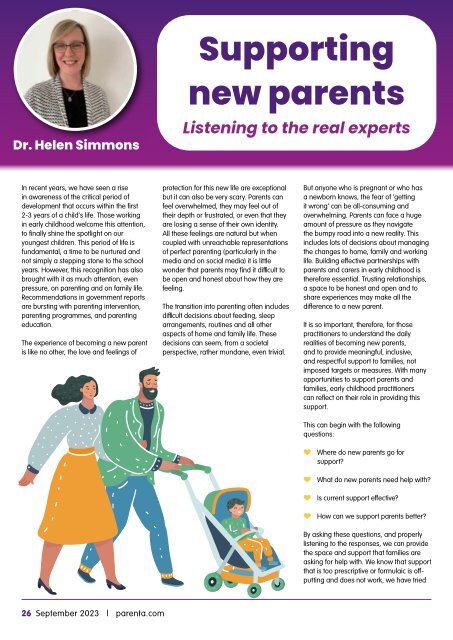September 2023 Parenta magazine
Create successful ePaper yourself
Turn your PDF publications into a flip-book with our unique Google optimized e-Paper software.
Supporting<br />
this in the past and we must now learn<br />
from the lessons. If delivering a top-down,<br />
one size fits all approach doesn’t work,<br />
then working alongside families and<br />
communities to break down barriers to<br />
support might.<br />
Dr. Helen Simmons<br />
In recent years, we have seen a rise<br />
in awareness of the critical period of<br />
development that occurs within the first<br />
2-3 years of a child’s life. Those working<br />
in early childhood welcome this attention,<br />
to finally shine the spotlight on our<br />
youngest children. This period of life is<br />
fundamental, a time to be nurtured and<br />
not simply a stepping stone to the school<br />
years. However, this recognition has also<br />
brought with it as much attention, even<br />
pressure, on parenting and on family life.<br />
Recommendations in government reports<br />
are bursting with parenting intervention,<br />
parenting programmes, and parenting<br />
education.<br />
The experience of becoming a new parent<br />
is like no other, the love and feelings of<br />
new parents<br />
Listening to the real experts<br />
protection for this new life are exceptional<br />
but it can also be very scary. Parents can<br />
feel overwhelmed, they may feel out of<br />
their depth or frustrated, or even that they<br />
are losing a sense of their own identity.<br />
All these feelings are natural but when<br />
coupled with unreachable representations<br />
of perfect parenting (particularly in the<br />
media and on social media) it is little<br />
wonder that parents may find it difficult to<br />
be open and honest about how they are<br />
feeling.<br />
The transition into parenting often includes<br />
difficult decisions about feeding, sleep<br />
arrangements, routines and all other<br />
aspects of home and family life. These<br />
decisions can seem, from a societal<br />
perspective, rather mundane, even trivial.<br />
But anyone who is pregnant or who has<br />
a newborn knows, the fear of ‘getting<br />
it wrong’ can be all-consuming and<br />
overwhelming. Parents can face a huge<br />
amount of pressure as they navigate<br />
the bumpy road into a new reality. This<br />
includes lots of decisions about managing<br />
the changes to home, family and working<br />
life. Building effective partnerships with<br />
parents and carers in early childhood is<br />
therefore essential. Trusting relationships,<br />
a space to be honest and open and to<br />
share experiences may make all the<br />
difference to a new parent.<br />
It is so important, therefore, for those<br />
practitioners to understand the daily<br />
realities of becoming new parents,<br />
and to provide meaningful, inclusive,<br />
and respectful support to families, not<br />
imposed targets or measures. With many<br />
opportunities to support parents and<br />
families, early childhood practitioners<br />
can reflect on their role in providing this<br />
support.<br />
This can begin with the following<br />
questions:
















